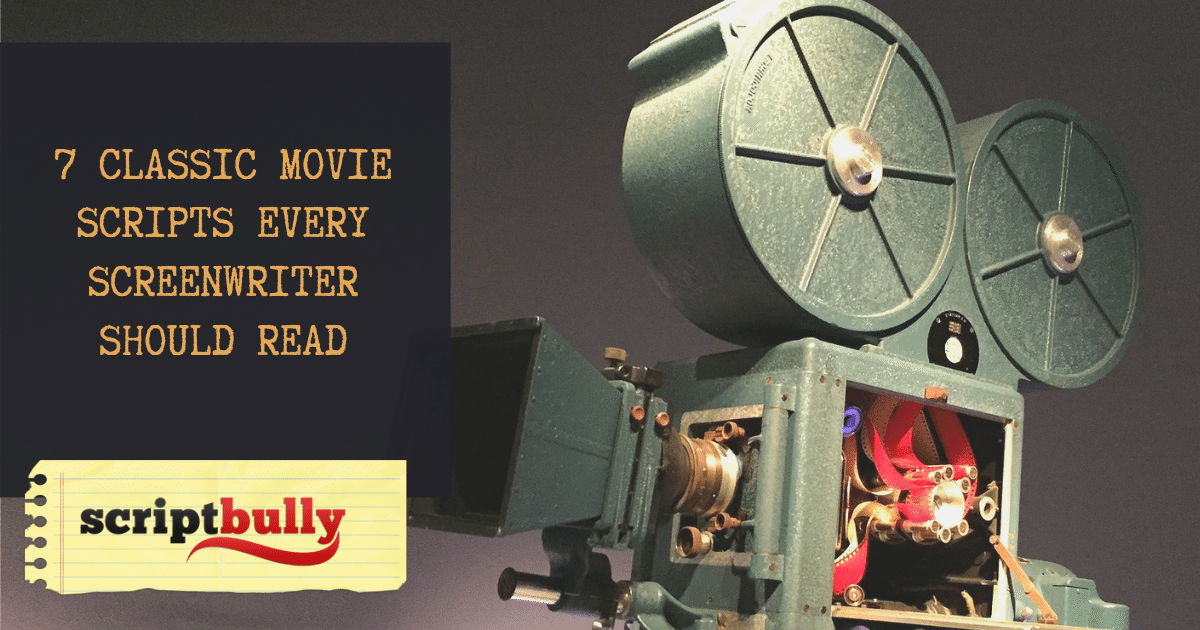Forget film school, one of the best ways to boost your screenwriting game is to read classic movie scripts. (And mercilessly “steal/borrow” every technique they demonstrate.)
But which classic movie scripts should you read? (And no “Ice Pirates” doesn’t count.)
So, here are 7 Classic Movie Scripts Every Screenwriter Should Read (and Add to Their Bookshelf):
Note: You can find most of these screenplays online.
7 Movie Scripts Worth Having in Your Collection
 Classic Movie Scripts Every Screenwriter Should Read #1: Die Hard
Classic Movie Scripts Every Screenwriter Should Read #1: Die Hard
“John McClane wasn’t just a cop in the wrong place at the wrong time. Okay, that’s kind of John McClane’s thing, yes, but as a character, he was more than that. He was a father. Beyond that, he was an estranged father. He was also a husband. Beyond that, he was an estranged husband. He wasn’t cool about it. He wasn’t indifferent about it. He was conflicted. He wanted his wife back but he also struggled with her decisions regarding their marriage. And to top it off, he didn’t like himself very much. He comes off as overly confident, however, he’s all too often talking down to himself under his breath. He’s vulnerable. And what that does is allow audiences to relate to him.”
-Ken Miyamoto, screenwriter and author who worked in development at Sony. Current president of Wisconsin Screenwriters Forum
Ken Miyamoto @KenMovies | Twitter
https://screencraft.org/2015/09/09/5-lessons-die-hard-can-teach-screenwriters
Summary: Die Hard teaches screenwriters the important lesson of complicating heroes. Make them vulnerable, make them have something to lose. When we think of an action movie, we think of strong, larger-than-life heroes. But to work in a screenplay, those heroes need to have something to fight for and something that they’re at risk of losing. (And make it visceral!)
 Classic Movie Scripts Every Screenwriter Should Read #2: Eternal Sunshine of the Spotless Mind
Classic Movie Scripts Every Screenwriter Should Read #2: Eternal Sunshine of the Spotless Mind
“The main characters are literally losing their minds, living through memories or dreams or friction of imagination, a constant deja vu, which the audience has to go through as well…The subtleties present in the script often become clues to understanding what is going on, as what happens when Joel stutters on the word “remember.” It’s got all the trademarks of a Kaufman script, including the most important one: a socially awkward protagonist and the complexities of the mind.”
-Alex Gandra, writer and filmmaker and contributing writer to tasteofcinema.com
Summary: Eternal Sunshine of the Spotless Mind teaches us that a strong concept is great, but subtleties and smart details are what take a great concept and make it an award-worthy screenplay. A couple going to a clinic to erase memories of each other is a completely unique idea, but the screenplay becomes a joy to read because of all the nuances, all the subtle cues that make a fantastical idea seem credible.
 Classic Movie Scripts Every Screenwriter Should Read #3: American Beauty
Classic Movie Scripts Every Screenwriter Should Read #3: American Beauty
“The picture’s character types are difficult to pitch because the ever-heightening tension between them recurs in any high school soap opera: There’s the bickering mom and dad, the cheerleader, the weirdo, the traumatized military vet, and the one who has to piece them all together. What makes them original is not in who they are, but what they do. Refusing to be typecast, Ball’s characters reveal themselves the way an illusionist removes his cloak; like someone we’ve met, but have never been able to figure out until one ineffaceable action reveals his or her life’s stakes. They keep us guessing until the grand finale.”
-Alex Koenig, Arts & Entertainment columnist for Huffington Post
http://www.huffingtonpost.com/alex-koenig/american-beauty-anniversary_b_5716047.html
Summary: Leaving some mystery in your characters is a skill American Beauty teaches. You want to toe the line, as a writer, between giving away too much information and leaving some to be interpreted. The more thoughtful and analytical your audience is, the more they’ll enjoy the movie-going experience. Put some mystery in your screenplay that the audience can uncover. (Even if you’re writing a non-mystery genre.) Your characters will be more complicated and authentic and your viewers will enjoy breaking the characters down. Also make sure that your characters aren’t just clichés. If they’re stereotypes, make them unique and personal.
 Classic Movie Scripts Every Screenwriter Should Read #4: Jerry Maguire
Classic Movie Scripts Every Screenwriter Should Read #4: Jerry Maguire
“Self-delusion is commonly the starting place for a movie where the journey is for the character to come upon emotional honesty, emotional authenticity. And so when we talk about sort of how useful it is for a character to lie, that’s not that the movie should be lying. It’s that the character needs to have progress from this inauthentic state to an authentic state at the end, and Jerry Maguire is a great example of that.”
– John August, Director and Screenwriter whose work includes Big Fish, Go, and Charlie’s Angels
John August @johnaugust | Twitter
http://johnaugust.com/2014/scriptnotes-ep-151-secrets-and-lies-transcript
Summary: The basic building blocks of a good screenplay involve the story starting in one place, complicating, and ending up changed, but you need to make sure that your characters go through an internal overhaul over the course of the screenplay as well. If you have your characters lie to themselves, like Jerry Maguire does, it makes the audience question what they’re hiding and who they want to be. It helps solidify who they were in the beginning and who they became in the end.
 Classic Movie Scripts Every Screenwriter Should Read #5: Blue Velvet
Classic Movie Scripts Every Screenwriter Should Read #5: Blue Velvet
“After the resounding failure of David Lynch’s Dune, he wanted to return to a more personal place with his filmmaking. The director started forming his thoughts for what would become Blue Velvet, about a mysterious nightclub singer and group of deranged criminals, with only three ideas: a severed ear in a field, a “feeling” (and the film’s title), and Bobby Vinton’s version of the song ‘Blue Velvet.’ After several drafts, he pursued a deal. Sometimes a fragment or a seed is all it takes.”
-Alison Nastasi, weekend editor of Flavorwire and freelance film writer featured on Cinematical, Fandango, Moviefone and MTV
Alison Nastasi @alistasi | Twitter
http://flavorwire.com/441918/10-famous-film-scripts-and-what-you-can-learn-from-them/2
Summary: Blue Velvet teaches screenwriters what can come from a few small ideas. Take what inspires you– whether it’s an image, a tone, or music– and start there. You have to be interested and excited about what you’re writing to create something others will be excited about too. Keep writing, start small, and see where it takes you.
 Classic Movie Scripts Every Screenwriter Should Read #6: Little Miss Sunshine
Classic Movie Scripts Every Screenwriter Should Read #6: Little Miss Sunshine
“After 10 years in the film business toiling as an assistant and script reader, with $25,000 in savings, the New York University film school grad, [Michael Arndt- screenwriter of Little Miss Sunshine] decided to take a stab at writing his first professional screenplay in 1999. He quit his job. He holed up in his cheap Brooklyn apartment and knocked out six stories. Six of them didn’t sing. The seventh did. ‘It was the most simple story,’ Arndt says. ‘That’s a mistake a lot of scripts make: Their plots are too complicated, so you don’t have time for characters.’ So he kept working on it, writing it over and over and over, 100 drafts, until it was as good as he could get it. ‘I said, ‘Dammit, if I’m going to do something, do it right,” Arndt says. ‘I had read enough mediocre scripts and was determined not to inflict another one on the world.'”
-Anne Thompson (film critic), in her article for Hollywood Reporter on Michael Arndt’s Little Miss Sunshine success
Anne Thompson @akstanwyck | Twitter
http://www.hollywoodreporter.com/news/closet-screenwriter-arndt-comes-light-143562
Summary: Little Miss Sunshine is a prime example of how a simple plot can be extremely effective. The characters are rich and complex, but they’re simple. They are broken down, quite simply, into what they want and how they get what they want. The plot doesn’t need to be overly complicated and contrived, it just needs to work. The more seamlessly it’s structured, the more complicated it will feel. Complex characters will lead the way to strong plot, and without strong characters, it doesn’t matter what happens to them.
 Classic Movie Scripts Every Screenwriter Should Read #7: Goodfellas
Classic Movie Scripts Every Screenwriter Should Read #7: Goodfellas
“There’s something about hearing a character’s play-by-play of his life that makes us more tolerant of the terrible things he does. If Henry is robbing people and cheating on people and killing people without him ever telling us why, there’s a good chance we’ll turn on the character. But because he’s explaining it to us as he goes along via voice over, we understand his choices. It’s kind of like hearing that some random person you don’t know is cheating on their spouse. You immediately conclude that they’re a terrible person. But when your best friend cheats on their spouse, and they explain to you why they’re doing it and what went into the choice, you’re more okay with it. Voice-over can be very powerful that way.”
-Carson Reeves, author and screenwriting blogger on Scriptshadow.com
Carson Reeves @Scriptshadow | Twitter
http://scriptshadow.net/10-screenwriting-tips-you-can-learn-from-goodfellas
Summary: Voice-over is a tool you should only use in your film scripts if you do it really, really well and if necessary to the plot. Scorsese uses it expertly in Goodfellas. Why? Because it’s used to help us get behind his actions. He does questionable things in Goodfellas, things that could turn an audience off if they don’t understand why he’s doing these things. The audience need to root for him and to root for him, we need to understand him. The voice-over is invaluable in literally taking us into his head. He doesn’t tell us more than what we need to know, but just enough.
What’s Your Screenwriting Take?
Got a couple classic movie scripts that you think should be on the list? And that I’m an idiot for not including? Let us know in the comments below.






